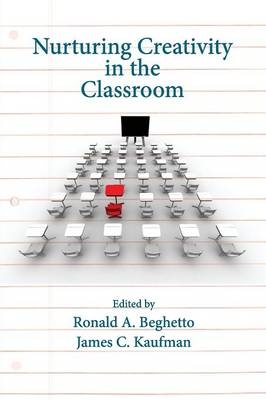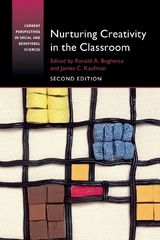
Nurturing Creativity in the Classroom
Cambridge University Press (Verlag)
978-0-521-71520-1 (ISBN)
- Titel erscheint in neuer Auflage
- Artikel merken
Ronald A. Beghetto, Ph.D., is an Associate Professor of Education Studies at the University of Oregon. His scholarship focuses on promoting creativity in K-12 classrooms and the influence of past schooling experience on K-12 teacher development. His recent publications on creativity and teacher development appear in a wide variety of scholarly journals - including the Creativity Research Journal, the Journal of Creative Behavior, Creativity and Thinking Skills, Educational Psychologist, the Journal of Advanced Academics, the Journal of Research in Science Teaching, and the Journal of Educational Research - and edited volumes: Creativity and Reason in Cognitive Development, Creativity: From Potential to Realization, Creativity: A Handbook for Teachers, Critical Issues and Practices in Gifted Education, and Rethinking Gifted Education. He serves on the editorial boards of Psychology of Aesthetics, Creativity, and the Arts; the Journal of Creative Behavior; and the Journal of Educational Research and is an Associate Editor for the International Journal of Creativity and Problem Solving. He is the 2008 recipient of the Daniel E. Berlyne Award from the American Psychological Association's Division 10. He has also received awards for excellence in teaching, including the 2005–2006 Crystal Apple Ersted Award for Outstanding Teaching from the University of Oregon. James C. Kaufman, Ph.D., is an Associate Professor of Psychology at the California State University at San Bernardino, where he directs the Learning Research Institute. His research broadly focuses on nurturing and encouraging creativity. He is specifically interested in creativity's role in fairness, everyday creativity, increasing creativity in the classroom, and the structure and assessment of creativity. He is also interested in related topics such as intelligence, personality, motivation, and thinking styles. Kaufman is the author or editor of 16 books, either published or in press, including Creativity 101, Essentials of Creativity Assessment (with Jonathan Plucker and John Baer), the International Handbook of Creativity (with Robert Sternberg), and Applied Intelligence (with Robert Sternberg and Elena Grigorenko). His research has been featured and discussed in the articles or broadcasts of CNN, NPR, New York Times, Los Angeles Times, New Yorker, and the BBC. Kaufman is a founding co-editor of the official journal for the APA's Division 10, Psychology of Aesthetics, Creativity, and the Arts and edits the International Journal for Creativity and Problem Solving. He is also the Associate Editor of Psychological Assessment and the Journal of Creative Behavior. He received the 2003 Daniel E. Berlyne Award from APA's Division 10, the 2008 E. Paul Torrance Award from the National Association of Gifted Children, and the 2009 Early Career Research Award from the Western Psychological Association.
1. How to discourage creative thinking in the classroom Raymond S. Nickerson; 2. Teaching for creativity in an era of content standards and accountability John Baer and Tracey Garrett; 3. Developing creative productivity in young people through the pursuit of ideal acts of learning Joseph S. Renzulli and Catharina F. de Wet; 4. Creativity: a look outside the box in classrooms Alexinia Young Baldwin; 5. Using constraints to develop creativity in the classroom Patricia D. Stokes; 6. Infusing creative and critical thinking into the curriculum together Elizabeth Fairweather and Bonnie Cramond; 7. The five core attitudes, seven I's, and general concepts of the creative process Jane Piirto; 8. Learning for creativity R. Keith Sawyer; 9. Broadening conceptions of creativity in the classroom Ronald A. Beghetto and James C. Kaufman; 10. Everyday creativity in the classroom: a trip through time with seven suggestions Ruth Richards; 11. Education based on a parsimonious theory of creativity Mark A. Runco; 12. Roads not taken, new roads to take: looking for creativity in the classroom Thomas Skiba, Mei Tan, Robert J. Sternberg and Elena L. Grigorenko; 13. Creativity in mathematics teaching: a Chinese perspective Weihua Niu and Zheng Zhou; 14. Possibility thinking and wise creativity: educational futures in England Anna Craft; 15. When intensity goes to school: overexcitabilities, creativity, and the gifted child Susan Daniels and Michael M. Piechowski; 16. Intrinsic motivation and creativity in the classroom: have we come full circle? Beth A. Hennessey; 17. Attitude change as the precursor to creativity enhancement Jonathan A. Plucker and Gayle T. Dow; 18. Creativity in college classrooms Diane F. Halpern; 19. Teaching for creativity Robert J. Sternberg; 20. Creativity in the classroom coda: 20 key points and other insights James C. Kaufman and Ronald A. Beghetto.
| Erscheint lt. Verlag | 28.6.2010 |
|---|---|
| Zusatzinfo | 20 Tables, unspecified; 18 Line drawings, unspecified |
| Verlagsort | Cambridge |
| Sprache | englisch |
| Maße | 155 x 235 mm |
| Gewicht | 610 g |
| Themenwelt | Geisteswissenschaften ► Psychologie ► Pädagogische Psychologie |
| Sozialwissenschaften ► Pädagogik ► Allgemeines / Lexika | |
| Sozialwissenschaften ► Pädagogik ► Bildungstheorie | |
| Sozialwissenschaften ► Pädagogik ► Didaktik | |
| ISBN-10 | 0-521-71520-2 / 0521715202 |
| ISBN-13 | 978-0-521-71520-1 / 9780521715201 |
| Zustand | Neuware |
| Haben Sie eine Frage zum Produkt? |
aus dem Bereich



